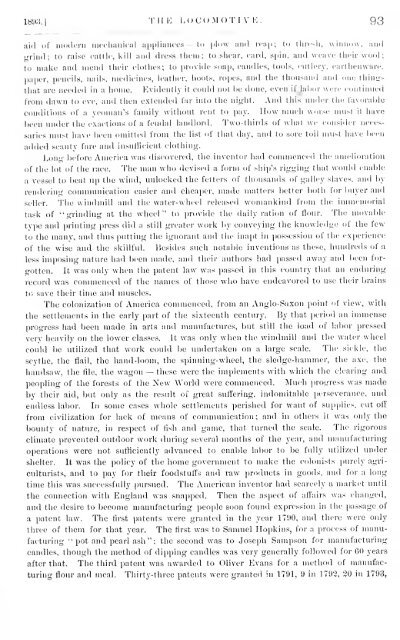The Locomotive - Lighthouse Survival Blog
The Locomotive - Lighthouse Survival Blog
The Locomotive - Lighthouse Survival Blog
Create successful ePaper yourself
Turn your PDF publications into a flip-book with our unique Google optimized e-Paper software.
IbyilJ THE LOCOMOTIVK. 93<br />
ai«l of modern nu'chaniciil appliaiu-es -- to i)lo\v and reap; to thn-sli, wiimow, uml<br />
"riiid; to raise cattle, kill and dress them; to shear, card, spin, and weave their wool<br />
to make and mend tluir clotiies; to provide soap, candles, tools, cutlery, earthenware.<br />
pa|)er, pencils, nails, medicines, leather, boots, ropes, and the thousand and one thinirs<br />
that are needed in a home. Evidently it could not be done, even if labor were continued<br />
from dawn to eve, ami then extended far into the night. And this under the favorable<br />
conditions of a yeoman's family without rent to pay. How much worse nuist it have<br />
been under the exactions of a feudal landlord. Two-thirds of what w'e consider neces-<br />
saries must have been omitted from the list of that day, and to sore toil nuist have been<br />
added scanty fare and insufficient clothing.<br />
Lon- before America was discovered, the inventor had commenced the amelioration<br />
of the lot of the race. <strong>The</strong> man who devised a form of ship's rigging that would enable<br />
a vessel to beat up the wind, unlocked the fetters of thousands of galley slaves, and by<br />
rendering communication easier and cheaper, made matters better both for buyer and<br />
seller. <strong>The</strong> windmill and the water-wheel released womankind from the immemorial<br />
task of "grinding at the wheel" to jn-ovide the daily ration of flour. <strong>The</strong> movable<br />
type and printing press did a still greater work by conveying the knowledge of the few<br />
to the many, and thus jnitting the ignorant and the inapt in possession of the experience<br />
of the wise and the skillful. Besides such notable inventions as these, hundreds of a<br />
less imposing nature had been made, and their authors had passed away and been for-<br />
gotten. It was only when the patent law was passed in this country that an enduring<br />
record was conunenced of the names of those who have endeavored to use their brains<br />
to save their time and muscles.<br />
<strong>The</strong> colonization of America commenced, from an Anglo-Saxon point of view, with<br />
the settlements in the early part of the sixteenth century. By that period an immense<br />
progress had been made in arts and manufactures, but still the load of labor pressed<br />
very heavily on the lower classes. It was only when the windmill and the water-wheel<br />
could be utilized that work could be undertaken on a large scale. <strong>The</strong> sickle, the<br />
scythe, the flail, the hand-loom, the spinning-wheel, the sledge-hammer, the axe, the<br />
handsaw, the file, the wagon — these were the implements with which the clearing and<br />
peopling of the forests of the New World were commenced. IMuch ])rogress was made<br />
by their aid, bat only as the result of great suffering, indomitable perseverance, and<br />
endless labor. In .some cases whole settlements perished for want of supplies, cut off<br />
from civilization for lack of means of communication; and in others it was only the<br />
bounty of nature, in respect of fish and game, that turned the scale. <strong>The</strong> rigorous<br />
climate prevented outdoor work during several months of the year, and manufacturing<br />
operations were not sufficiently advanced to enable labor to be fully utilized under<br />
shelter. It was the policy of the home government to make the colonists purely agri-<br />
culturists, and to pay for their foodstuffs and raw products in goods, and for a long<br />
time this was successfully pursued. <strong>The</strong> American inventor had scarcely a market until<br />
the connection with England was snapped. <strong>The</strong>n the aspect of affairs was changed,<br />
and the desire to become manufacturing people soon found expression in the passage of<br />
a patent law. <strong>The</strong> first patents w^ere granted in the year 1790, and there were only<br />
three of them for that year. <strong>The</strong> first was to Samuel Hopkin.s, for a process of manu-<br />
facturing "pot and pearl ash"; the second was to Joseph Sampson for manufacturing<br />
candles, though the method of dipping candles was very generally followed for 60 years<br />
after that. <strong>The</strong> third patent was awarded to Oliver Evans for a method of manufac-<br />
turing flour and meal. Thirty-three patents were granted in 1791, 9 in 1793, 20 in 1793,.<br />
;
















